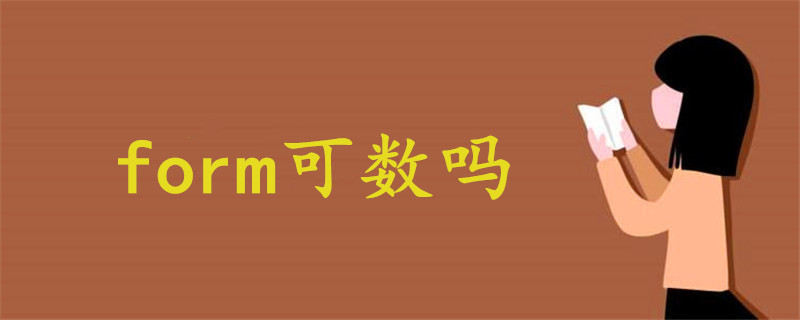form可数。form可作名词和动词,作为名词时,是可数名词,含义为“类型”、“形式”、“表格”、“体能”、“惯常做法”,复数形式为forms;还可作动词,含义为“产生”、“制作”、“组织”、“对…的发展有影响”。

form的基本含义及用法介绍
1、当form作为可数名词时,意为类型;种类;形式;外表;样子;表格;形状;结构,形式;体能;表现状态;惯常做法;礼貌;词形;年级;…年级学生。
例句:The disease can take several different forms.
这种疾病可能有几种不同的形式。
I filled in/out a form on their website.
我在他们的网站上填了一张表。
The human form has changed little over the last 30 000 years.
3万多年以来,人的体形没有多大变化。
In a novel form and content are equally important.
小说的形式和内容同样重要。
After six months' training the whole team is in superb form.
经过半年的训练,全队状态极佳。
She signalled her return to form with a convincing victory.
她令人信服的胜利显示她已恢复状态。
What's the form when you apply for a research grant?
申请科研补助金按常规应该怎么办?
Who's your form teacher?
你们年级的老师是谁?
2、当form作为动词时,意为(使)出现,产生;(使)形成;(使)成形,组成;制作;(使)排列成,排成;有…功能;是;组织;对…的发展有影响。
例句:Flowers appeared, but fruits failed to form.
开了花,但没有结果。
I formed many close friendships at college.
我大学时结交了许多密友。
Form the dough into balls with your hands.
用手把生面团揉成一些球团。
First get students to form groups of four.
首先让学生分成四人一组。
The trees form a natural protection from the sun's rays.
树木起天然的保护作用,遮挡了阳光的照射。
These drawings will form the basis of the exhibition.
这些画作将成为展览的基本部分。
Positive and negative experiences form a child's character.
正反两方面的经历都影响儿童性格的形成。










